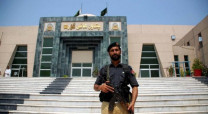Telecom sector: Pakistan’s poster industry likely to continue suffering
Analysts not too hopeful of any major positive developments until next government is sworn in.

“2013 will be a year of mergers, five operators are too many for this country,” says Jahangir. PHOTO: FILE
Pakistan’s telecommunication industry will continue to face harsh regulatory measures and suffer from bad governance for at least the first half of 2013, predict industry analysts.
Meanwhile, cellular phone consumers will see an increase in calling rates, while the telecom industry’s core focus will shift to streamlining regulatory bottlenecks that hurt growth. Chances of the rollout of the third generation (3G) mobile spectrum will also continue to remain slim, at least in the first half of the year.
These predictions have a strong grounding in developments in the telecom sector over 2012, a truly happening year for the industry. Cellular mobile operators (CMOs) remained in the headlines throughout the year for both good and bad reasons, but mostly for the bad ones.
During the year, the cellular services sector surpassed the 120 million subscribers mark, and two more operators – Mobilink and Zong – entered the mobile banking sector.
On the flipside, the government’s performance and regulatory decisions remained a major disappointment. The Pakistan Telecommunication Authority banned popular video-sharing website YouTube, and failed to auction licences for the 3G spectrum despite three attempts – a reflection of the incompetence of those in power to implement major decisions. The incumbent government also failed to pass the Prevention of Electronic Crimes Bill to make it a legal act.

In the year that passed, the government restricted a major sales channel for mobile operators by banning the sale of SIMs through retail outlets, causing a massive decline of about 85% in the industry’s sales. If that was not enough, the telecom regulator, while enforcing the interior ministry’s directives, kept suspending mobile services on various occasions. The periodic service suspensions cost millions of dollars in revenue losses both to the industry and the national exchequer, and added to the psychological stress of a nation already ravaged by terrorist acts.
Outlook
“This government cannot do anything for the industry’s benefit. The first half of 2013 will, therefore, be a continuation of its bad governance,” said an official who wished not to be named. “3G should be a high priority, but we may have to wait six more months for the next government,” he said.
These thoughts were echoed by Mudasir Jahangir, editor-in-chief of more – a Lahore-based publication that covers the telecom sector. “The government is entering the election phase: technically, it will need at least about five months for the auction if Public Procurement Regulatory Authority Rules and the Telecom Act are followed,” he said.
An across-the-board increase in calling rates is very much on the cards in 2013, as the banning of retail outlets has pressurised CMOs. Their sales network has shrunk from 200,000 outlets to a mere 2,000 official sales centers. They will now likely look to other means, including increases in tariffs, to increase their revenues.
“The overall subscriber growth will remain negative in 2013,” said Aamir Attaa, who operates Propakistani – an Islamabad-based blog that covers the information and communications technology industry. “This will result in a certain increase in cellular tariffs,” he said.
“Mobilink has already introduced new call setup charges. Additionally, Zong and Ufone – the two operators that have been fighting a price war – will soon realise that the time for price competition is over,” said Muhammad Raza, a telecom analyst at Elixir Securities.
The core focus of the CMOs, Raza said, will be to streamline the issues facing the industry – mainly finding a solution to the frequent suspension of mobile services by the government will be their priority.
“2013 will be a year of mergers,” Jahangir added. “Five operators are too many for this country,” he said. Zong has publicly announced that it wants to become the second-largest operator in the country by 2014. The goal will be difficult to achieve in the absence of a strong sales network, something Zong had been counting on. A merger with Warid – which is at the bottom of the list in terms of its subscriber base – is the only logical option for Zong if it wants to achieve the goal.
Published in The Express Tribune, January 7th, 2013.
Like Business on Facebook to stay informed and join in the conversation.



















COMMENTS
Comments are moderated and generally will be posted if they are on-topic and not abusive.
For more information, please see our Comments FAQ